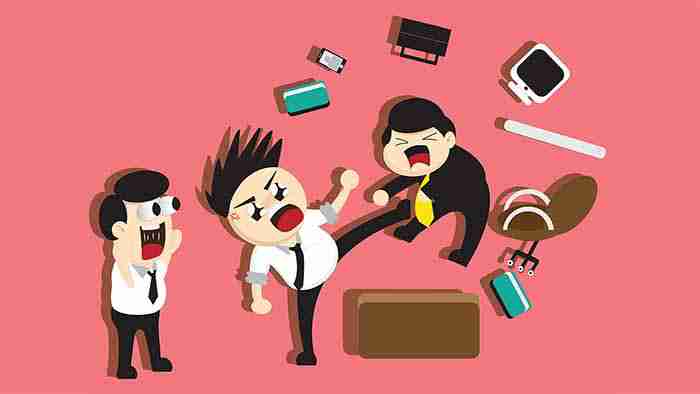A toxic workplace is defined as any work environment that makes you feel uncomfortable, undervalued, or underappreciated. Toxic can run the gamut from bullying and bad management to sabotage and hostility.
Often, people accept their fate, feeling trapped or lucky to have a job at all.
Your work environment plays a critical role in your long term happiness and health. According to research published in the PLOS ONE journal, happiness is directly linked to :
Workers in demanding roles with little control over their situation have higher rates of depression and heart disease .
And, when you factor in nasty coworkers and low social support, a negative work environment could be slowly poisoning both body and mind.
Here are some ways to identify whether you’re stuck in a negative environment, as well as some ways to make the time waiting out new job opportunities more bearable.
Signs that your workplace is toxic:

Poor communication
Poor communication can take a few different forms. This could mean that your boss fails to provide feedback or gives you the brush off. In other cases, you might be on the receiving end of negative feedback with no constructive information.
Other signs include colleagues deliberately not inviting you to important meetings or failing to CC you on important communications until the last minute.

Quitting time: signs that it’s time to look for a new job
Drama
Cliques, gossip, rumors, favoritism, and fighting. This is the stuff you should run away from fast. The watercolor shouldn’t feel like the high school cafeteria. When colleagues are gossiping, whispering into each others’ ears, it creates a sense of paranoia, anxiety, and stress.
Your boss is toxic
Sometimes, the toxic work environment can be chalked up to the trickle-down effect. How the boss treats employees has a major impact on the employee experience.
When employees see their boss acting like a bully, some may be inspired to follow suit and undermine their reports or colleagues. Turnover tends to increase, and motivation declines.
In some cases, people work in fear of being embarrassed, fired, or betrayed. Additionally, bad managers contribute to a culture of toxic competitiveness and dysfunctional office politics.

Complete guide to advancing your career
No respect
Disrespect comes in several different forms. Examples include making overt comments, interrupting someone before they are done speaking, or making jokes at someone’s expense.
People need to feel as though their opinions matter–and that they are being taken seriously on the job. Your boss should not ignore your comments or make negative comments, and neither should your peers.
Find your support system
Having a strong support system is essential regardless of how things are going at work, but especially so when you’re feeling like your colleagues are talking behind your back, your boss won’t listen to you, and you’re just plain miserable.
Building a support system outside of the office is recommended, but finding internal allies is even better. You need to be able to vent to someone who “gets it,” or at the very least, feel that you have someone you can trust in an uncertain environment.
Still, airing your grievances to anyone at work can cross over into the danger zone, so tread carefully and try to focus on building positive relationships at work. A friendly face can make the difference between total misery and a more bearable way to bide your time.
Those expletive-filled tirades about your boss? Save those for when you get home–just don’t do it all of the time. Friends and family will quickly grow tired of listening to the work rants.
Top 3 apps to make friends
Sometimes it is personal–try not to engage
We can always say, “Oh, don’t take it personally.” As much as that’s a noble goal, it’s just not realistic.
Gossip is often extremely personal. Or, your direct manager might really be treating you unfairly. Maybe there’s a colleague that just won’t stop throwing you under the bus.
Whatever it is, it probably is personal. Your best bet in these outwardly toxic situations is to avoid the gossip as much as possible and keep that head down. Your goal is to get the work done, collect a paycheck, and get out of there.
That said, sometimes conflict is inevitable. If confrontation finds you, be assertive and so that bullies don’t pick up on the message that you are a prime target.
How to deal with passive aggressive emails
Stick up for yourself
Look, nothing is going to change if you passively accept abuse in the workplace. For one, it might result in more bad behavior from the workplace bully. And secondly, failing to stick up for yourself can cause you to feel worse about the situation for letting yourself accept poor treatment.
Stand up for yourself when someone talks over you or fails to provide essential information. Just make sure you do this calmly, privately, and professionally. Yelling or getting upset in full view of your office mates won’t end the way you had in mind.
Unfortunately, you’re somewhat stuck in a relationship with these folks. So, be sure to make clear how you feel when someone says or does something that frustrates you. Initially, speaking up might be difficult–especially if you get red or shaky in the face of confrontation. Still, it’s better to stand your ground–over time, it will get easier. Plus standing up for yourself will help you hang onto your self-esteem during this trying time.
Complete guide to self-improvement: mind and body
Make sure you take care of yourself
The impact of a toxic environment is significant. Some people find themselves getting sick more often, dealing with chronic pain or insomnia. Over time, these things can impact our health, our relationships, our well-being.
Make sure you focus on getting enough sleep, exercising, and eating well. Try spending time outside and connecting with the people that make you feel good.
The thing is, focusing on your happiness will keep you grounded as you seek out new opportunities. When you’re desperate and stressed, the interviewer might pick up on those cues. Or, you might end up in another toxic workplace after making a rash decision to jump ship.
Work-life balance matters more when you’re miserable at work
Set clear boundaries. That means no more checking emails at all hours, working late, or coming in early. Work-life boundaries can reduce the negative impact of an unhealthy work environment. Things like spending time with friends and family outside of work, exercising, and taking lunch breaks away from the office can help you better manage the stressful situation.
Use this as a teachable moment
Look, we all end up in a job we hate at some point or another. But as you start looking for jobs, make sure you do not find yourself in a similar situation.
Do your homework by reading reviews on Glassdoor and Payscale to see what employees thought about the company. Additionally, pulling a company’s public record can reveal whether they get involved in a lot of lawsuits, engage in unlawful practices, or treat their customers poorly—red flags, to be sure.
Ask cultural questions in the interview. Examples include:
Additionally, try to look around the office as much as possible — is it clean and tidy? Do people seem happy? Is the bathroom in good shape? Did the interviewers seem prepared?
The point is, when you start booking interviews, exhaust all options during the research phase. After what you’ve been through, you deserve a job that values you.
More about careers
Guide to finding jobs with LinkedIn ►
How to future-proof your career ►
How to use social media to find your next job ►
How to write the best resume in Google Docs ►
